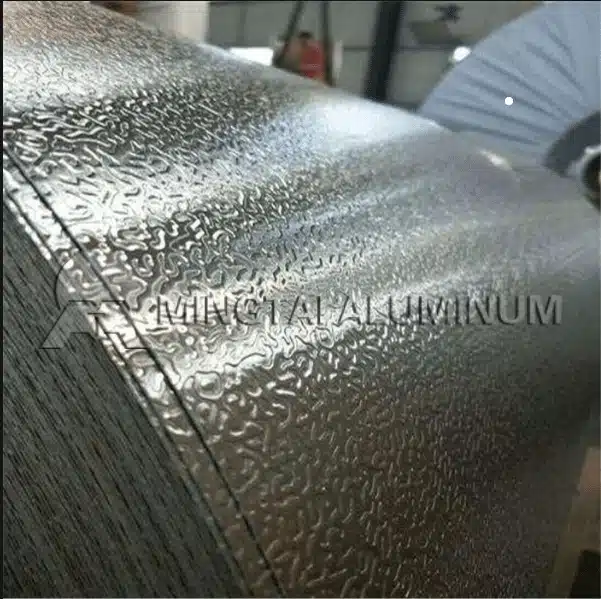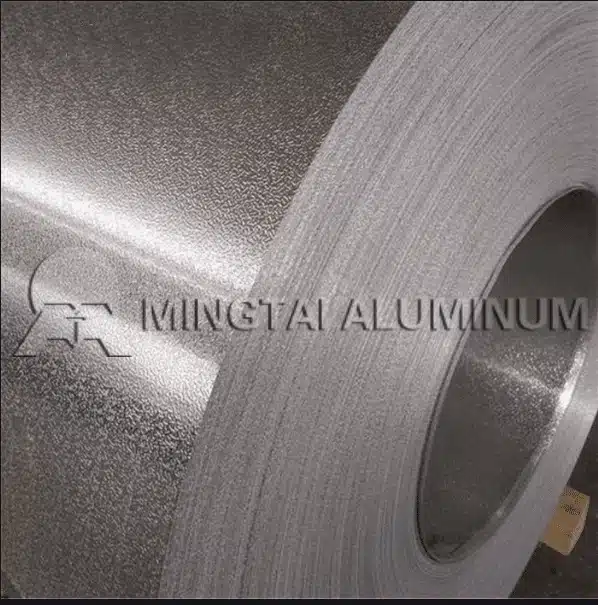
Precision stucco aluminum coil is key in many business and factory uses. It mixes toughness, rust proofing, and nice looks. Making this stuff takes a careful, step-by-step method. The goal is even surface feel, exact thickness, and strong build qualities. Top makers like MINGTAI ALUMINUM have top-notch setup to handle the rising need for high-quality aluminum rolls. MINGTAI ALUMINUM has solid output power. We make 1.4 million tons of aluminum sheet and foil each year. This gives steady supply to lots of local and global companies.
What Is a Precision Stucco Aluminum Coil?
A precision stucco aluminum coil is a stamped aluminum item. It has a rough surface that looks like orange skin or plaster. This design boosts the look. It also adds strength and cuts down on shine. People use it a lot in heat barriers, cooling gear, fancy panels, and cover layers. That's because it's light and easy to shape.
The word "precision" means close limits on thickness, width, stamp depth, and surface polish. These traits fit uses that need steady quality and work.
Materials Used in Precision Stucco Aluminum Coil Production
Picking the right base stuff is key to the end traits of precision stucco aluminum coils. Different aluminum mixes are picked based on the job:
1050 aluminum coil is very bendy. It fights rust well. It also moves heat and power easily. 5052 alloy aluminum coil is strong. It fights tiredness a lot. It's bendy and rust proof. 5754 aluminum coil is an AL-MG rust-proof type. It has fair strength. It fights rust well. It's easy to weld and shape. 8011 aluminum coil fits drug wraps, food packs, wire covers, milk lids, and seal foils.
These mixes are chosen for their build strength, rust fight levels, shaping ease in stamp work, and fit with add-ons like paints or layers.
Step-by-Step Process — How Precision Stucco Aluminum Coil Is Made
Step 1 — Melting and Casting of Aluminum Ingots
The work starts with melting pure aluminum or mixed scrap in big ovens. Once it's liquid, the metal is poured into big flat blocks called ingots. This uses nonstop pour machines. These blocks are the start for more rolling steps.
Step 2 — Hot Rolling and Cold Rolling for Thickness Control
After pouring, the blocks are warmed up. They go through hot roll machines to thin them down a lot. This also betters the grain setup. Next comes cold rolling. Here, more thinning happens at room temp. This keeps tight size limits.
MINGTAI ALUMINUM can handle 8011 aluminum coil at 0.006-0.2mm thick. This shows their skill for making super-thin rolls for exact jobs.
Step 3 — Annealing for Ductility and Surface Stability
Cold rolling makes it harder but less bendy. To fix bendiness without losing too much power, annealing happens in set ovens. This heat step eases inner strains. It also steadies the surface. That's vital before stamping.
Step 4 — Stucco Embossing Process
The softened coils go into stamp mills. They pass between two rollers. One is smooth. The other has the plaster design carved in. The squeeze moves the design to both sides (or one) of the coil evenly.
This step needs exact control on roller fit and squeeze levels. That keeps the stamp depth the same across wide coil sizes.
Step 5 — Surface Coating and Polysurlyn Lamination
To boost rust fight or fit look needs, the stamped coils might get surface paint or anodizing. In heat barrier jobs, like for AC systems or pipes, a polysurlyn layer goes on one side. That's a wet block film.
This layer guards against metal mix rust when put over steel or in wet spots.
Step 6 — Quality Inspection and Coil Packaging
Every precision stucco aluminum coil gets tough checks. These cover eye looks for even stamp designs. Size checks for width and thickness limits. Stick tests for paints. And flatness reviews.
Once the check teams okay it, coils get cut to needed widths if required. Then they're wrapped in guard stuff like craft paper or plastic sheets. They're tied on wood bases for safe shipping.
Applications of Precision Stucco Aluminum Coil
Precision stucco aluminum coils get used in many fields:
Heat barrier covers in oil and gas pipes Cool truck panels Fancy wall covers Roof panels Power box shells Air duct setups Food gear outer layers
Their rough surface hides touch marks. It also adds strength. That's helpful as outer guards over heat barriers.
Advantages of Precision Stucco Aluminum Coil
Several benefits make these coils indispensable in engineering solutions:
- Lightweight yet strong: Ideal substitute for heavier metals
- Corrosion-resistant: Especially when made from alloys like 5052 or coated with polysurlyn
- Aesthetic appeal: Stucco finish offers an attractive look without painting
- Enhanced rigidity: Embossed texture increases stiffness without adding weight
- Ease of fabrication: Compatible with bending/forming operations without cracking
1060 aluminum coil has flat surface, high cleanliness good elongation and tensile strength can fully meet the conventional processing requirements (stamping, stretching) and high formability. Such properties make it ideal for use in embossed formats like precision stucco coils.
Why Precision Stucco Aluminum Coil Ensures Quality and Reliability
Makers like MINGTAI ALUMINUM use strict checks at each step. This goes from base pick to end wrap. It makes sure every coil hits world standards for build soundness and steady work.
MINGTAI ALUMINUM's 1060 aluminum coil uses full-grown tech. It's good quality and cheap. This push for top work spreads to all their lines. That includes precision stucco items.
Moreover, 3104 aluminum coil shapes deep well. Our firm keeps tight watch on each step. So the item has right power and shaping ease. Such close watch gives steady results even in hard shaping needs for stamped goods.

If you want top-grade precision stucco aluminum coils with smart make tech and strong check systems, MINGTAI ALUMINUM can tweak work to fit buyer wants. We offer fit fixes in many mix types like 1050, 1060, 3005, 5052 and more. All are built for top work in heat barriers, build finishes or factory shells.
Pick MINGTAI ALUMINUM now. We are your sure partner for steady precision stucco fixes around the world.
FAQ
Q: What is a Precision Stucco Aluminum Coil used for?
A: A Precision Stucco Aluminum Coil is often used in heat jacketing, roofs, wall covers, cooling systems, and air ducts. Its rough plaster surface adds firmness and cuts shine. This makes it great for AC, factory, and build jobs.
Q: How is a Precision Stucco Aluminum Coil made?
A: A Precision Stucco Aluminum Coil comes from a many-step method. It covers melting and pouring aluminum blocks, hot and cold rolling for thickness hold, annealing for bend, stamping for surface rough, and adding guard paints or Polysurlyn layers for rust fight.
Q: Which aluminum alloys are used in Precision Stucco Aluminum Coil production?
A: Usual mixes in Precision Stucco Aluminum Coil making include 1060, 3003, 5052, and 8011. Each gives key perks like rust fight, shaping ease, and power. It depends on the job.




